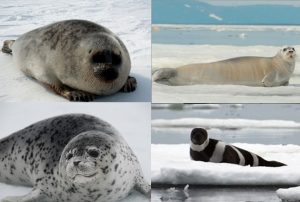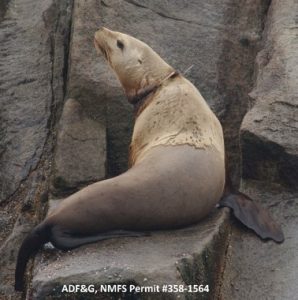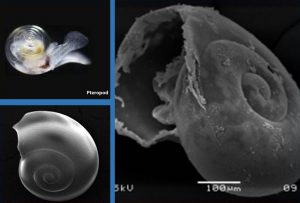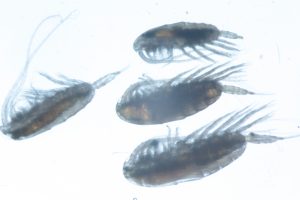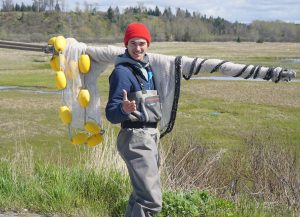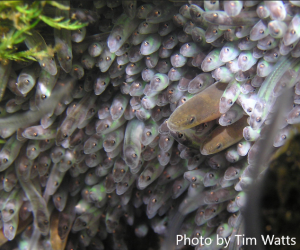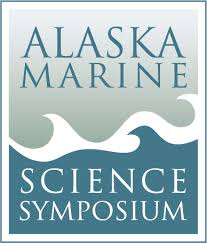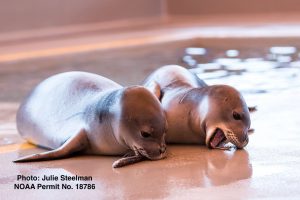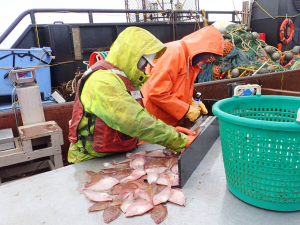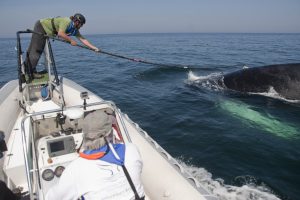That’s the Seal-iest Thing I’ve Heard: Studying Ice Seals in Alaska
Erin Moreland, Cynthia Christman, and Heather Ziel, from NOAA Fisheries Alaska Fisheries Science Center in Seattle, WA What are ice seals and how do we study them? Join researchers from the Polar Ecosystems Program at NOAA Fisheries’ Alaska Fisheries Science Center to learn about bearded, ringed, spotted, and ribbon seals in Alaska and the methods…
Read MoreLose the loop: How did entangled Steller sea lions lead to Alaska’s first Ocean Guardian schools?
Kim Raum-Suryan, NOAA Fisheries’ Alaska Region in Juneau, AK Join us as we learn about how marine debris impacts Steller sea lions, how we disentangle Steller sea lions, and how this helped us bring NOAA’s Ocean Guardian School Program to Alaska. Explore more about the Ocean Guardian School Program, how you can get this program…
Read MoreIt’s Not Easy Being Shelled: The Ocean Acidification Blues
Meg Chadsey, NOAA’s Washington Sea Grant and the NOAA Pacific Marine Environmental Lab in Seattle, WA Excess carbon dioxide (CO2) isn’t just warming the planet; it’s also reacting with seawater and making the oceans more corrosive—a process known as ocean acidification. This slight increase in acidity doesn’t change the way the ocean looks or feels…
Read MoreLet’s Talk about Fish Food: Zooplankton in the Eastern Bering Sea
Deana Crouser, NOAA Fisheries Alaska Fisheries Science Center in Seattle, AK What do you think fish eat in the ocean? A lot of fish eat zooplankton in the Bering Sea. Join us to find out how zooplankton response to climate change can affect what fish are available for us to eat! Resources to access at…
Read MoreSalmon in the Winter: Anadromous fish under ice
Coowe Walker and Jacob Argueta, NOAA’s Kachemak Bay National Estuarine Research Reserve in Kachemak Bay, AK What do you know about baby salmon? Join us to learn about where salmon spend their early life stages, and how they survive in watersheds blanketed with snow and ice. We will talk about the importance of groundwater on…
Read MoreDambusters at Work: Restoring Habitat for Migratory Fish
Eric Hutchins, NOAA Restoration Center in Gloucester, MA Soon after the Pilgrims landed at Plymouth Rock they began to build dams on Town Brook in Plymouth, Massachusetts. Every dam built impacted the migratory pathway of American eel and river herring which need to reach fresh water streams to complete their lifecycle. This talk will describe…
Read MoreAlaska Marine Science Symposium in Anchorage: Cutting-Edge Science Connecting with Education
Elizabeth Siddon, NOAA Fisheries Alaska Fisheries Science Center in Juneau, AK, and Mark Van Arsdale, Eagle River High School in Eagle River, AK Every January in Anchorage, scientists, educators, resource managers, students, and the public come together at the Alaska Marine Science Symposium (AMSS) conference to discuss the latest marine research being conducted in Alaska…
Read MoreIt Takes a Village to Save the Hawaiian Monk Seal
Stacie Robinson, NOAA Fisheries Pacific Islands Fisheries Science Center in Honolulu, HI and Wendy Marks, the Marine Mammal Center in Kona, HI Did you know that Hawaiʻi is home to the world’s only tropical seal – the Hawaiian monk seal? You’ll learn about these highly endangered marine mammals, where they live, and the conservation efforts…
Read MoreSome Like It Hot, Some Like It Cold: Monitoring Fish and Ecosystems With Bottom Trawl Surveys in Alaska
Sean Rohan from NOAA Fisheries Alaska Fisheries Science Center in Seattle, WA How do bottom trawl surveys help monitor fish populations and ecosystems in Alaska? Learn about the diverse marine life we see, the data we collect, and what it’s like to be a scientist at sea. Resources to access at home: » Fishing Gear:…
Read MoreWhale and Seek: The Underwater Lives of Whales
Dave Wiley, NOAA Stellwagen Bank National Marine Sanctuary in Scituate, MA How do you know what whales do in the wild? They are too big for an aquarium and disappear from view at every dive. New technologies let scientists attach body movement and acoustic (sound) or video recording tags to whales to watch and listen…
Read More
